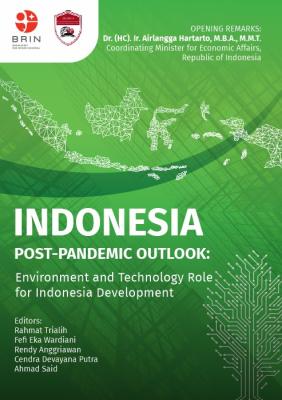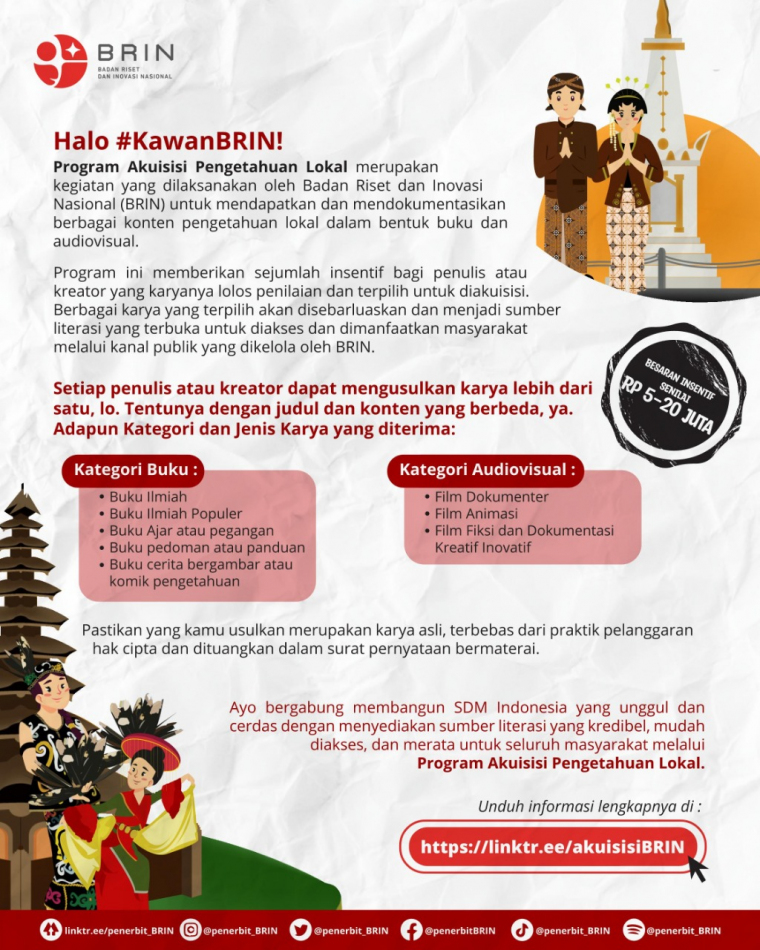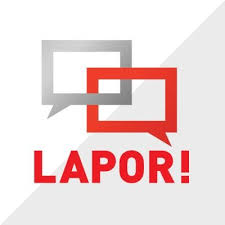Indonesia Post-Pandemic Outlook: Environment and Technology Role for Indonesia Development
Keywords:
PPI Dunia, Technology, Environment, Post-Pandemic, Environment Protection, Human ResourceSynopsis
COVID-19 has disrupted all aspects of human life. To mitigate the impact of the pandemic, several efforts have been taken, including by Indonesian scholars abroad. This book entitled Indonesia Post-Pandemic Outlook: Environment and Technology Role for Indonesia Development explores environment and technology issues and topics related to the COVID-19 pandemic and discusses post-pandemic recovery efforts in Indonesia. Comprising of 19 chapters, this book is divided into four sections. The first section, disaster and greening management development, discusses insights for a better solution in disaster prevention and development of greening management. Second, waste and pollution management development, explores options in development of waste and pollution management such as potentials uses of membrane technology, remediation of textile dyes, biochar industry, and also discussion on persistent organic pollution and microplastics. Third, food defense and security development, explores the potentials of food security and management in utilizing the potential of coastal sand marginal land resources, IoT and smart packaging, and smart food supply chain. The last part, human resource and public service development, discuses developments on management of education system, public transportation, e-government, and health information system. We hope that this book can be a valuable reference for stakeholders, policymakers, as well as society to recover from the pandemic crisis and find better solutions to benefit future generations.
Chapters
-
Environment and Technology as the Foundation of Indonesia’s Sustainable Development
-
Defossilizing Chemical Industry as an Integrated Solution for Indonesia's Climate and Pandemic Crisis
-
Nature-Based Solution and Regenerative Circular System Design towards Agricultural Land Management Bioremediation: A Review
-
Remediation of Heavy Metals Polluted Soils in Indonesia
-
Soil Erosion Estimation Using RUSLE Method
-
The Use and Potential of Membrane Technology for Wastewater Treatment in Post-COVID-19 Pandemic
-
Persistent Organic Pollutants (POPs) in Indonesia
-
Impacts of Textile Dyes on Health and the Environment and Its Remediation
-
The Existence of Microplastics as an Emerging Concern in Daily Routines and the Implications of Global Mitigation Efforts
-
The Integrated Biochar Industry for Indonesian Rural Area Households: Study case on Forest Biomas and Carbon Sequestration
-
Utilizing The Potential of Coastal Sand Marginal Land Resources in The Framework to Improve Food Security Post-COVID-19 Pandemic in Indonesia
-
IoT and Smart Packaging: A Novel Approach for Managing Food Waste
-
Smart Food Supply Chain: Recommendations after COVID-19 Pandemic in Agricultural Industry
-
Establishing Knowledge Management System to Support the Education System
-
Public Transportation Transformation Towards a Smart, Efficient and Inclusive System
-
A Decentralized File Storage for Effective E-Government
-
Brief Introduction of Hospital Information System
-
Electronic Health Record
-
Conclusions and General Recommendations Regarding Environment and Technology as the Foundation for National Development
Downloads
References
Basso, A. S., Miguez, F. E., Laird, D. A., Horton, R., & Westgate, M. (2013). Assessing potential of biochar for increasing water-holding capacity of sandy soils. GCB Bioenergy, 5(2), 132–143. https://doi.org/10.1111/GCBB.12026
Budiyanto, G., Aini, L. N., & Sari, S. A. (2020). Land suitability for soybean (Glycine max (L.) Merill) in sandy coastal land of Parangtritis, Bantul Regency. IOP Conference Series: Earth and Environmental Science, 458(1), 012007. https://doi.org/10.1088/1755-1315/458/1/012007
Adeinat, I. M., & Abdulfatah, F. H. (2019). Organizational culture and knowledge management processes: case study in a public university. VINE Journal of Information and Knowledge Management Systems, 49(1), 35–53. https://doi.org/10.1108/VJIKMS-05-2018-0041
Aguilera-Hermida, A. P., Quiroga-Garza, A., Gómez-Mendoza, S., del Río Villanueva, C. A., Avolio Alecchi, B., & Avci, D. (2021). Comparison of students’ use and acceptance of emergency online learning due to COVID-19 in the USA, Mexico, Peru, and Turkey. In Education and Information Technologies (Vol. 26, Issue 6, pp. 6823–6845). Springer. https://doi.org/10.1007/s10639-021-10473-8

Downloads
Published
License

This work is licensed under a Creative Commons Attribution-NonCommercial-ShareAlike 4.0 International License.






























